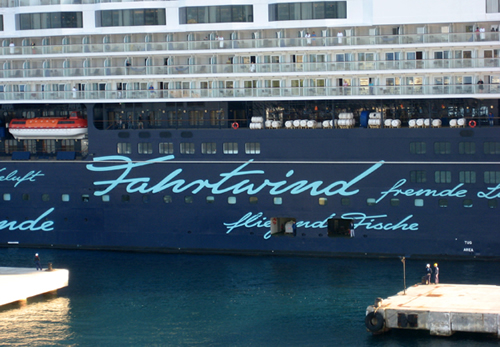
© 2011 UrbisMedia
“Gut morgan, mein herr.”
I don’t get that salutation very often, although I was once addressed as “Herr Professor Docktor” in Austria, and I am beginning to look more and more like John Rabe [see DCJ 33. 5: The Good German of Nanking 6.17.2006] Then I realized that the polyglotted shopkeeper in the bazaar at Kusadasi took me for someone off the huge German ship with a smiley face painted on the funnel and tagged with other scriptural attempts to be clever and hip. He took me to be a passenger from a ship called the FAHRTWIND.
OK, there are a lot of foreign words that can raise a snicker. The British have a bird called a “tit”; we Americans think cool is a cool word, but it sounds like cul (Fr.) or culo (It.), which means anus; and then there is the French word for a seal, or phoque, which is pronounced like our much used F-word. Every language much have words that when pronounced have a very unintended meaning in other languages. But I had to guffaw and grab my camera when this ship docked alongside us in the morning.
Remember the great German ocean liners out of Bremerhaven in the old days? Of course you don’t. There were the Bremen, the Europa, the Deutschland, the Kaiser Wilhelm, Imperator, and the Bismark (not the battleship). One of the German lines displayed the motto Mein Felt is die Welt. They looked like ships, not like floating harmonicas, with mostly black hulls and funnels without happy faces on them. Some of the names might have been a bit too proud and imperious (as they were for other nations as well), but they had more panache than the ludicrously named Vision of the Seas (not a German ship) that pulled into port later that day. A few years ago, in The Stranger is Me, I concocted a ship I called the Geriatricus because there were so many senior citizens aboard. In fact, Geriatricus sounds more noble than some of the names they give to cruise ships these days. Names such as Fair Wind, Song of Flower and Crystal Harmony sound more appropriate for perfumes, album covers and china place settings than for sailing vessels. One cruise line names its ships Ecstasy and Fantasy, to be joined soon, one supposes, by The Orgasmic? A ship should be named after a city, a country, an ocean, or some god of Greek mythology; something that conveys a sense of connection with history or the sea, not a scratch-and sniff fragrance from a glamour magazine.
Well, it turns out that Fahrtwind, despite its snickerish connotations to English speakers means something like “airstream” in German. I congratulate the German shipping line for not succumbing to the almost universal use of English names for cruise ships. The actual name of the ship is MEIN SCHIFF (My Ship), which is also a little stupid. Even so, the blockish and ungraceful Fahrtwind is not very airstreamed in form, only adding to the irony.
As with so many other areas of contemporary social life, cruising has evolved into a niche industry. The experience one might have, or one might be inclined to have aboard a cruise ship, can vary greatly. There are cruises for younger people who like to dance and party into the wee hours of the morning and enjoy wet T-shirt contests, cruises for senior citizens (perhaps the fattest parts of the market, although such cruises are not marketed specifically for oldies). There are Disney cruises for kids, cruises for eco-travelers, jazz cruises, cruises for gays and lesbians (not together though), New Age spiritualists, even nudists. Cruising has gone the way of television, the movies, popular music, and most other dimensions of life where the market and bean-counters hold the reigns of popular taste.
The Fahrtwind, with its scribblings all over its hull and its happy face funnel, is probably trying to tap into the young cruisers niche in Europe. But their promotion people might have taken a second look at the fact that Americans comprise the largest segment of the cruising market. How many of them might be daunted to sign on to a cruise when the photos you send home of Mein Schiff can be mistaken for the SS Flatulence.
____________________________________________________________
© 2011, James A. Clapp (UrbisMedia Ltd. Pub. 10.19.2011)
